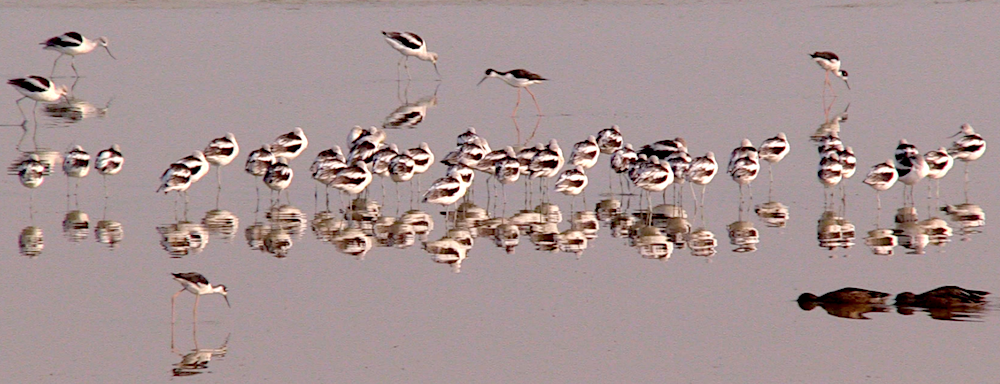
The Trump administration is moving forward with plans to weaken the Migratory Bird Treaty Act, which helps protect numerous species, including these Black-necked stilts seen at the Great Salt Lake/Kurt Repanshek file
Despite the loss of billions of birds over the past five decades, and the economic benefits of sustained migratory species, the Trump administration is moving forward with plans to weaken the Migratory Bird Treaty Act by allowing unintentional killings of birds.
The posting of the U.S. Fish and Wildlife Service's final environmental impact statement on the changes to the act come, ironically, despite a federal judge ruling this past summer that the revisions produced by the Interior Department are "contrary to the plain meaning of the MBTA and therefore must be vacated."
While public comment on the EIS runs through December 28, the changes are opposed by a bipartisan collection of politicians in Congress, 25 states, and various conservation groups.
“President Trump may have pardoned a turkey this week, but he’s in a frenzy to finalize his bird-killer policy before the end of the year,” David Yarnold, president and CEO of the National Audubon Society, said Friday. “The administration lost in court and is sidestepping that ruling with a rushed, corrupt process designed to keep the next administration from saving the lives of millions of birds. Reinstating this 100-year-old bedrock law must be a top conservation priority for the Biden-Harris administration and the 117th Congress.”
Back in August, U.S. District Judge Valerie Caproni of the Southern District of New York pointed to where the so-called Jorjani Opinion that drove the changes to the act lacked needed substance -- "the Opinion is riddled with ambiguities made only more apparent by the incoherent guidance FWS subsequently issued." -- and was counter to the Interior Department's "prior longstanding position and enforcement practices" under the treaty.
The judge was referring to an opinion written in 2017 by Daniel Jorjani, a deputy solicitor in the Interior Department. It held that penalties under the treaty could be applied only to intentional acts -- hunting and trapping, for instance -- that killed migratory birds. "Incidental" takings, such as the deaths of migratory birds that land on an uncovered pond of hazardous wastes, should not be penalized, the opinion stated.
"Interpreting the MBTA to criminalize incidental takings raises serious due process concerns and is contrary to the fundamental principle that ambiguity in criminal statutes must be resolved in favor of defendants," wrote Jorjani.
At Defenders of Wildlife, officials said the MBTA's prohibition on the killing or “taking” of migratory birds "has long been understood to extend to incidental take from industrial activities—meaning unintentional but predictable and avoidable killing."
According to Audubon's staff, industrial operations kill millions of birds annually:
- Power lines: Up to 64 million birds per year (Source: http://journals.plos.org/plosone/article?id=10.1371/journal.pone.0101565)
- Communication towers: Up to 7 million birds per year (Source: http://journals.plos.org/plosone/article?id=10.1371/journal.pone.0034025)
- Oil waste pits: 500,000 to 1 million birds per year (Source: http://www.ncbi.nlm.nih.gov/pubmed/16988870)
- Oil spills: The 2010 Deepwater Horizon oil spill is estimated to have killed more than 1 million birds (http://www.audubon.org/news/more-one-million-birds-died-during-deepwater-horizon-disaster)
The move to weaken the act comes as billions of birds have gone missing since 1970, according to a Science article referenced in 2019 State of The Birds report.
According to that report, the Ruddy Turnstone, a shorebird, has seen its population plummet 80 percent since 1974; the population of Baltimore Orioles has fallen 44 percent since 1970; and the numbers of the Northern Bobwhite have dropped by 78 percent since 1970.
As a group, species of shorebirds, many of which are migratory, have declined 37 percent since 1974, grassland birds have plunged 53 percent since 1970s, and forest species have fallen 22 percent since 1970, the report notes.
The pervasive declines among American birdlife spread well beyond the rare and threatened species; it is a crisis for almost all birds everywhere. Just 15 species of “common birds” (species that were once abundant, such as meadowlarks, juncos, blackbirds, and swallows) account for more than two-thirds of the total loss in native bird populations. Our common birds are now suffering population losses in the tens of millions—similar to the decline of the Passenger Pigeon. -- 2019 State of the Birds report
Against those losses, conservation efforts have made progress in restoring habitat needed by migratory species, the report said. Reversing the trends can have huge economic benefits, it also noted, as 2.4 million hunters of migratory species spent $2.3 billion in 2016, while 45 million bird watchers spent another $7 billion on their hobby.
“We will continue to fight these changes in court, but we need Congress to pass the Migratory Bird Protection Act to reinforce this vital law,” Yarnold said.
At Defenders, staff said the Fish and Wildlife Service had "failed to even study in detail the alternative of creating a reasonable permit system and how a system could address concerns about burdens on industry while protecting migratory birds."
“This is another step by the U.S. Fish and Wildlife to jam through a rule to cement an interpretation of the Migratory Bird Treaty Act that a federal court has already declared illegal," said Defenders President and CEO Jamie Rappaport Clark. "At a time when North America has already lost 3 billion birds, the rule will further undercut our nation’s ability to conserve birds so many people care about deeply.”
There is legislation in the House, the Migratory Bird Protection Act, to counter the administration's changes to the act and bolster to the century-old law, but time is running out on the lameduck Congress to act on the proposal.



Add comment